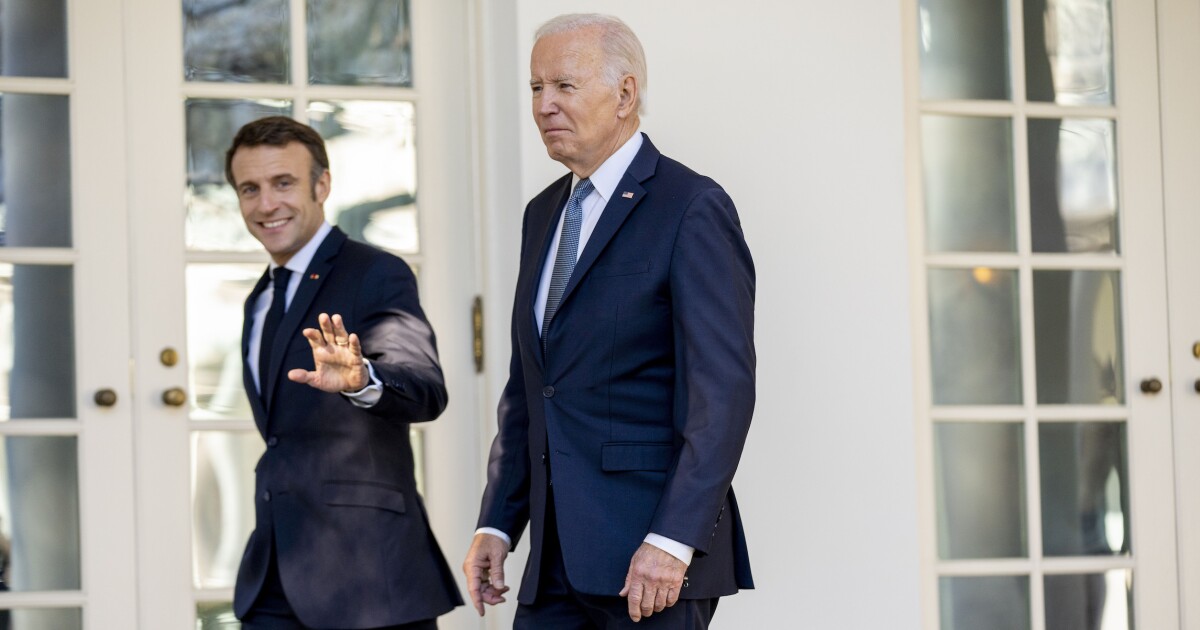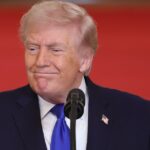

The state visit between President Joe Biden and his French counterpart, Emmanuel Macron, brought to a head a simmering debate over trade policy between the United States and its European allies.
Macron brought up, and Biden vaguely pledged to address, how “buy American” subsidies for electric vehicles made in North America would put Europe at a competitive disadvantage.
BIDEN CELEBRATES ECONOMIC POSITIVES, BUT DANGER LIES AHEAD
“The choices made, whose goals I share, especially the [Inflation Reduction Act] or the CHIPS [and Science] Act, are choices that will fragment the West because they create such differences between the U.S. and Europe,” Macron said during a speech at the French Embassy. “Those who work in these industries will simply decide not to keep investing on the other side of the Atlantic. These choices can only work if there is coordination between us.”
The $7,500 electric vehicle subsidy is designed to help the U.S. transition to green energy — and to protect manufacturing jobs that are critical to Biden’s support in the Midwest and among unions. It only applies to vehicles manufactured in North America, which has upset trading partners across Europe and in Asia, including major U.S. allies South Korea and Japan.
The controversy has been brewing for months but was brought to the fore by Macron’s arrival on the White House’s South Lawn.
In response to the criticism, Biden acknowledged “glitches” in the bill but said during a joint press conference with Macron that they could be fixed with “tweaks we can make.”
It’s unclear what those tweaks would be.
“I knew when I read the bill that this was going to be a problem,” said Tori Smith, director of international economic policy at the American Action Forum. “As written, the provisions on clean vehicle tax credits violate U.S. trade agreements. Because it shows preference for domestic manufacturing, it’s considered discriminatory trade.”
But politically speaking, Biden would take a big risk with any loosening of the credit. His wooing of domestic manufacturers puts him largely in alliance with his predecessor, former President Donald Trump, and he’d be unlikely to want to upset that constituency. Smith said Biden is “between a rock and a hard place” in trying to supplement American-made products while also staying in the good graces of trading partners.
Democrats who crafted the IRA seem unlikely to budge.
“Congress passed a law to rev up the American electric automobile industry, create good-paying American jobs, and tackle climate change at the same time,” Senate Finance Committee Chairman Ron Wyden (D-OR) said Thursday. “I have no intention of reopening it.” Other congressional Democrats have made similar remarks.
An exception has been Sen. Raphael Warnock (D-GA), who is still fighting for reelection against GOP candidate Herschel Walker. Warnock has asked the Treasury Department to use “maximum flexibility” in applying the tax credit because South Korean manufacturer Hyundai invests billions of dollars in a Georgia electric vehicle plant.
While Biden mentioned tweaks and glitches this week, his previous actions indicate he’s fine with the buy American subsidy as-is, argued American Enterprise Institute senior fellow Claude Barfield.
“They must have seen this coming for months,” Barfield said. “This is not something that took them by surprise. And in touting this legislation he’s made a big deal that this money is going to American companies and American workers alone.”
Even in saying it was possible to make tweaks, Biden added that he supports the core idea of the subsidy, saying, “The U.S. makes no apology. And I make no apology since I wrote the legislation.”
Biden often calls himself the most pro-union president in history and has touted traditional manufacturing, especially in Midwest and rust-belt cities, throughout his first term in office. In the 2020 election, he flipped the states of Michigan, Wisconsin, and Pennsylvania from Trump, which proved decisive in his Electoral College victory. Biden has since made multiple visits to each state, often touting his progress in reviving American manufacturing.
CLICK HERE TO READ MORE FROM THE WASHINGTON EXAMINER
But from an economic perspective, the subsidies could prove problematic in the long run and also may undermine any climate-related goals by making electric vehicles more costly.
“Other nations could implement their own buy-local rules, their own electric vehicle subsidies,” Smith said. “That just creates a race to the bottom. It makes it more difficult for consumers to have choices and options.”







